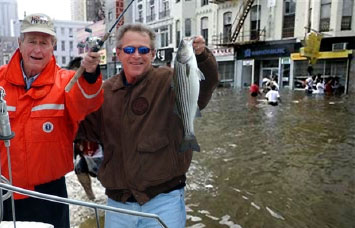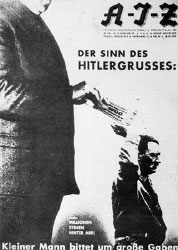 |
→ October 2005 Contents → Commentary
|
Forwarded Through the Looking Glass
|
 |
|
I love the English language, although I have to admit that because it's the only one I speak I don't have much with which to compare it. I love its nuances, subtleties and eccentricities, and I get really annoyed when it's used badly. Into this category are what seems to be an increasing number of stupid sayings that attach themselves to the language like certain tropical parasites, and they're equally irritating and difficult to get rid of. One of the pits of deformed phraseology is the airline industry, as I'm sure that most of you have experienced. Take, for instance, "We're making our initial descent into the New York area." When I'm on a plane I don't want to descend into the New York area but right down the middle of a runway at John F. Kennedy airport, and I want the descent to be the only one we make, not the initial one. I'm not paying good money to have a trainee pilot take a couple of stabs at it. There's also one associated with our profession that I take issue with, namely that "a picture is worth a thousand words." I went on the Internet recently to find out who first coined this monster and, wouldn't you know, it looks like it was the Chinese again. Not content with manufacturing everything we use, from alarm clocks to marital aids, they're getting into the cliché business as well. In fact the original proverb quoted the number as being ten thousand words, which is even more distressing since the initial figure has caused us in the picture-taking business quite enough trouble. Not only did it incense writers, who as we all know have always enjoyed much more power and prestige than photographers, but it has constantly been misinterpreted by editors as meaning that any picture has to be surrounded by at least a thousand words in order to get the balance right. I for one want to know whose picture are we talking about, and what thousand words? Is the mug shot on my driver's license worth a thousand words from William Butler Yeats? I don't think so. On the other hand, a battlefield photograph by Donald McCullin contains more wisdom than all the words Donald Rumsfeld will ever utter in his entire career. You see what I mean? It's a worthless phrase.
What initiated my Web quest was one of those scurrilous e-mails that pop into our in-boxes with increasing frequency nowadays and deal with our beloved leader George "Not My Fault" Bush. This one showed Bush Major and Bush Minor enjoying a harmless day's fishing in the waters of what used to be New Orleans. In the unlikely event that you haven't seen it I've enclosed it below.

Looking at it started me thinking about the comparative values of an image such as this and the straightforward photographs of Katrina's aftermath that we published here in The Digital Journalist in September. This one is, of course, a crude fabrication, and on the surface at least, the antithesis of everything that I was taught as a photojournalist. It's biased propaganda that manipulates photography to produce a false representation. It probably also violates at least two photographers' copyrights, but we may never know that for certain because whoever initiates these things chooses to be anonymous and could be the author of both images. As I looked at it I tried to remember what it reminded me of, when I suddenly realized that it was the work of the German anti-Nazi collagist John Heartfield. So vehemently disgusted with his country over the rise of Nazism in the late 1920s and early '30s that he anglicized his name, Heartfield became famous for his covers of the Arbeiter-Illustrierte Zeitung that lampooned the leaders of National Socialism in a similar manner to the Bush boys on vacation. When Hitler said that "millions stand behind me" he meant people, but Heartfield produced a collage showing that the millions were actually Deutschemarks from leading German industrialists.

He also produced powerful covers of Joseph Goebbels lighting the night with a bonfire of books and Hermann Goering as an executioner that is to this day one of the scariest things I have ever seen. Heartfield was not a photographer - he employed photographers to supply the elements for his work - but he was an articulate and courageous voice against the regime that he hated, and he and the publication continued to be outspoken until 1933 at which point, fearing for their lives, he and the magazine's staff fled to Prague.
The landscapes of post-Weimar Republic Germany and present-day America are analogous, with the dissimilarities far outweighing the similarities. We have neither the massive unemployment nor the hyperinflation that occurred in Germany then; our government is still accountable to the people; we still have freedom of speech and assembly. I do not expect leather-coated men to take me away in the middle of the night when I write something critical of the administration the way that Heartfield did. Nevertheless, there are similarities that may be fueling the flurry of Internet images. We don't have a one-party system in this country, but sometimes the ineptitude, incompetence and hesitancy of the opposition make it seem like we do; the state doesn't control the press but sometimes it seems like it does for the same reasons stated above; we have experienced considerable erosions in our personal freedoms and rights to privacy since September 11th, 2001 - some would say justifiably for our own good; others claiming excessively - and as always there are the conspiracy freaks who see a darker agenda in everything that happens; anger and hatred are not institutionalized in our country as they were in Germany in the 1930s but if you listen to talk radio it often sounds as if they could be.
Under these circumstances do we have to shout louder to be heard? For really that is what the author of the Bush collage is doing. He or she is saying, "The ghastly images coming out of New Orleans are not strong enough to make a difference." I suppose the chilling question we have to consider is: "At what point is journalism ineffective, and when do you have to fight propaganda with propaganda?" NBC's Brian Williams recently received a lot of kudos when he appeared on Jon Stewart's "Daily Show" for his outspoken criticism of the way the situation in New Orleans was handled, but isn't that his job? Walter Cronkite was far more direct over a much greater period of time in his comments on the way that the Vietnam War was being run. How is it that we've gotten to a point where Rush Limbaugh and Pat Robertson can criticize anyone they wish in the meanest of terms, and yet we're surprised when a news anchor offers a negative assessment based on his own experience? At this stage the myth of a liberal bias in the media is exactly that - a myth.
The more forwarded e-mails I get the more my in-box seems like Alice Through The Looking Glass, a place where the truth gets lost in fair and balanced reporting, and the drug-induced ravings of the late Hunter Thompson make more sense than the president's State of the Union address. This nugget of information dropped into my e-mail recently: Saatchi & Saatchi chief executive Kevin Roberts says he has been approached by George W to rebrand the war on terror. According to the Times, Saatchis was commissioned to replace the unfortunately acronymed WOT with "something groovier and more inclusive." Sadly, the proposed replacement - the "fight for a better world" - appears not to have made the cut. The news is sounding more like an excerpt from The Kingdom of Fear everyday, and what is real and what is false harder to determine, but after doing a Google search it seems that the story is true. Now I'm as big a fan of weirdness as the next guy, maybe more so, but to convene a meeting to discuss re-branding a war is way out of my league. Even McNamara didn't try to pull that one off.
There is, of course, another explanation to this growing electronic counter-culture, and one that I fervently hope is true, which is that the Bush collage is just the normal workings of democracy, and the proliferation of such images reflects a healthy commonwealth expressing itself more effectively through technology. Let's keep in mind that the job of a journalist is not only to report on society but also to be its early warning system. If we're not doing a good enough job, or if the job we're doing is being stifled by frightened and conflicted publishers, then the anonymous e-authors of manipulated photographs and humorous but fake news reports may be more effective at giving this country the wake-up call it needs than the purveyors of "fair and balanced" reporting. Hopefully this won't happen, for if recent events don't raise public awareness nothing will.
With the carnage in Iraq approaching 2,000 U.S. servicemen and women and God knows how many civilians, with New Orleans looking like Port-au-Prince, and Houston, the oil capital of America, running out of gas, if all of this doesn't get the message across that something's seriously awry, then bring on the collagists, the comics, the poets and musicians, anyone who can restore sanity to the land. The good Dr. Thompson used to frequently quote Edmund Burke who said, "The only thing necessary for the triumph of evil is for good men to do nothing."
© Peter Howe
Executive Editor
|
|
Back to October 2005 Contents
|
|